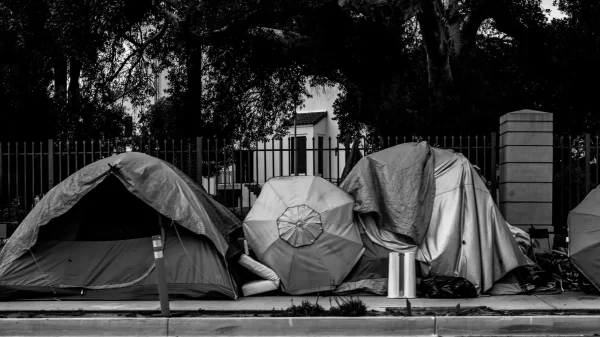|
Getting your Trinity Audio player ready...
|
According to the U.S. Interagency Council on Homelessness Annual Report for Fiscal Year 2023, homelessness in the U.S. increased by 12 percent from January 2022 to January 2023. On any given night, 653,100 people were experiencing homelessness, the highest reported number since 2007.
In Alabama, the situation is no different, with thousands of unhoused individuals struggling to survive and facing serious consequences for asking for help.
Approximately 3,261 people in Alabama were homeless on any given day five years ago. This includes veterans, families, and young adults, many of whom face chronic homelessness.
Among them are Jonathan Singleton, Ricky Vickery and Micki Holmes—residents of Montgomery, Alabama, who rely on panhandling as a means of survival. Despite the legal risks, all three continue to panhandle to support themselves and their families.
For these individuals, surviving on the streets is made even harder by state laws that criminalize panhandling. The “Begging Statute” in Alabama prohibits loitering in public places for begging, while the “Pedestrian Solicitation Statute” bans standing on highways to solicit contributions. These laws target those without homes, like Singleton, Vickery and Holmes, who are forced to ask for help in public spaces to survive.
In 2020, Singleton, Vickery, and Holmes filed a lawsuit against the City of Montgomery and state officials, challenging the constitutionality of the statutes. Their legal argument is that these laws violate their First Amendment rights by placing content-based restrictions on their ability to ask for donations.
The plaintiffs also argue that the statutes act as a prior restraint on their speech, which prevents them from expressing themselves in public spaces without a permitting process, which is generally considered unconstitutional.
In 2020, Montgomery settled with Singleton and agreed to stop enforcing the contested statutes, forgive any fines and contribute $10,000 to homeless initiatives. However, litigation continued against state officials.
By 2022, a federal court issued a preliminary injunction halting enforcement of the laws. A settlement was reached with Montgomery County Sheriff Derrick Cunningham, who agreed to stop enforcing the solicitation statutes. But the legal battle continued with Alabama Law Enforcement Agency Secretary Hal Taylor.
In 2023, a federal court ruled that the Alabama statutes against panhandling were unconstitutional, asserting that they violated the First Amendment. Taylor was permanently barred from enforcing these laws.
The case did not end there. Taylor appealed the decision, and the matter is now before the 11th U.S. Circuit Court of Appeals, which is expected to issue a final ruling later this year.
Amici briefs have been filed to support the plaintiffs, arguing that criminalizing begging is an outdated practice and a violation of free speech protections. They point to cases in the 2nd and 6th circuits where similar laws were struck down.
Alabama, however, defends its laws by invoking historical precedents that considered beggars as “paupers” who forfeited certain civil rights. However, these arguments are seen as incompatible with modern constitutional principles, which protect the rights of all individuals, regardless of their socioeconomic status.
The case could have broader implications for the way homelessness is treated in the U.S. and how laws that target panhandling are enforced. Advocates argue that protecting the right to beg not only safeguards freedom of speech but also helps raise awareness about homelessness and poverty.





















































